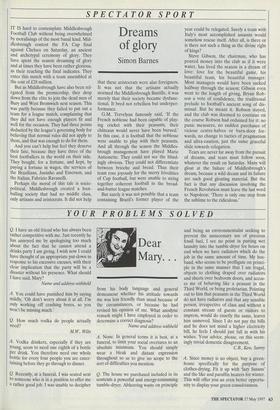SPECTATOR SPORT
Dreams of glory
Simon Barnes
IT IS hard to contemplate Middlesbrough Football Club without being overwhelmed by moralisings of the most banal kind. Mid- dlesbrough contest the FA Cup final against Chelsea on Saturday, an ancient and archetypal ceremony of glory. They have spent the season dreaming of glory and at times they have been rather glorious, as their reaching the final indicates. They enter this match with a team assembled at the cost of £28 million.
But as Middlesbrough have also been rel- egated from the premiership, they drop down from the elite to join the dead men of Bury and West Bromwich next season. This was partly because they failed to put out a team for a league match, complaining that they did not have enough players fit and well for the occasion. They had three points deducted by the league's governing body for believing that normal rules did not apply to them, and that was enough to do for them.
And you can't help but feel they deserve their fate, because they have three of the best footballers in the world on their side. They bought, for a fortune, and kept, by paying a fortune in wages, the services of the Brazilians, Juninho and Emerson, and the Italian, Fabrizio Ravanelli.
Perhaps the moral of this tale is socio- political. Middlesbrough created a foot- balling society that had no middle class, only artisans and aristocrats. It did not help that these aristocrats were also foreigners. It was not that the artisans actually stormed the Middlesbrough Bastille, it was merely that their society became dysfunc- tional. It bred not rebellion but underper- formance.
G.M. Trevelyan famously said, 'If the French noblesse had been capable of play- ing cricket with their peasants, their chateaux would never have been burned.' In this case, it is football that the noblesse were unable to play with their peasants. And all through the season the Middles- brough management have played Marie Antionette. They could not see the blind- ingly obvious. They could not differentiate between brioche and bread. Thus their team rose joyously for the merry frivolities of Cup football, but were unable to string together coherent football in the bread- and-butter league matches.
But surely it was not possible that a team containing Brazil's former player of the year could be relegated. Surely a team with Italy's most accomplished assassin would somehow rescue itself. After all, is there or is there not such a thing as the divine right of kings?
Steve Gibson, the chairman, who has poured money into the club as if it were water, has lived the season in a dream of love: love for the beautiful game, his beautiful team, his beautiful manager. Most managers would have been sacked halfway through the season; Gibson even went to the length of giving, Bryan Rob- son a vote of confidence, the traditional prelude to football's ancient song of dis- missal. But he meant it. Robson stayed, and the club was doomed to continue on the course Robson had ordained for it: no panic measures, no sudden purchases of vicious centre-halves or barn-door for- wards, no change to tactics of pragmatism and ultra-caution, just the same graceful slide towards relegation.
Tears are never far away from the pursuit of dreams, and tears must follow soon, whatever the result on Saturday. Many will gloat at the failure of Middlesbrough's dream, because a wild dream and its failure are such good gloating material. But the fact is that any discussion involving the French Revolution must leave the last word to Napoleon: 'There is only one step from the sublime to the ridiculous.'


































































 Previous page
Previous page